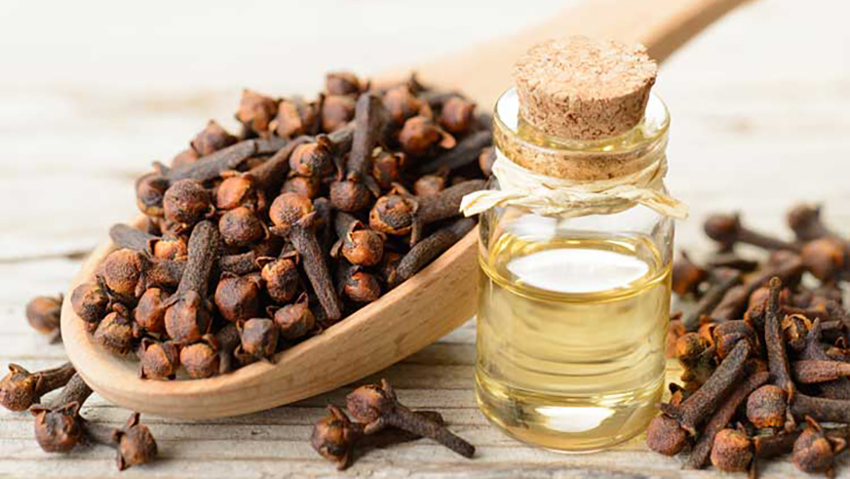Eugenol is an important nutrient found in some essential oils. It is an aromatic compound that is extremely effective against fungi, bacteria, and viruses.
Our focus today is clove oil and the effects of the nutrients. It is known for its numbing and analgesic effects, and dentists have used this oil for many years to fill root canals and oral health.
Main ingredients of Clove Oil
Eugenol is an allyl chain-substituted guaiacol of the phenylpropanoids in clove oil.
It is a well-researched substance that reduces bacteria responsible for inflammation as well as diarrhea (salmonella, fungi, staph) within a few minutes.
Another supplement of Clove oil is beta-caryophyllene which supports the eugenol very well.
Also, Oleanolic acid which is also present in ivy, olive leaves, or ginseng, is an important ingredient of clove oil.
There is also a high proportion of polyphenols in the oil. Polyphenols in the oil are considered to be the strongest antioxidant found in plants.
These are considered antioxidants and reduce free radicals in your body. Free radicals cause oxidative stress, which causes the aging of the skin to accelerate faster. In addition, free radicals are also responsible for some diseases.
Benefits of Clove Oil
In antiquity, clove oil was an important remedy mainly used against inflammations and epidemics.
Even as a disinfectant, Clove oil has a good reputation. In particular, its popularity and efficacy to relieve toothache and it was therefore used many years ago in dentistry.
Midwives still recommend a tampon with clove oil to trigger labor and thus accelerate the birth process. Another area of application of clove oil is the treatment of abraded, warts, or even purulent wounds.
It was even used against bloating and was often effective as a remedy.
Because of its harsh and pungent odor, it is also used and effective as anti-mosquito remedy because mosquitoes do not like the smell of clove oil.
Clove Oil against toothache
You can make your clove oil for teething, as a mouthwash to reduce bacteria and germs causing tooth decay. it will help reduce inflammation and kill infections.
Clove Oil has a very numbing effect due to the eugenol ingredient. Therefore, it is very much used for toothaches. It may be enough to chew dried cloves if the pain is not much and you will be fine.
If you use the oil, although it’s safe if you swallow some of it, but not advisable to drink it, use it every day for too long, or let it spend much time in your mouth.
What happens when you take too much clove oil is the sensitivity of teeth and irritation it’s dangerous and can cause dental issues, liver problem, and other side effects.
It should only last a couple of minutes in your mouth before you pour it out and rinse your mouth to prevent it from burning your gums and killing tooth nerves.
Clove Oil against Bad Breath
Since the Clove essential oil kills pathogens, bacteria, and germs, it can also be used in inflammatory halitosis. To do this, it is enough to put some drops in water and put them in the mouth to permanently end the halitosis problem.
Clove Oil against inflammation
Due to the high proportion of eugenol in clove oil, the oil has an anti-inflammatory effect. It is used on the skin to reduce inflammation of the skin and acne. It can be applied directly to the affected area of the skin
In addition, the ingredient also influences hormone formation, which is responsible for the prevention of inflammation and not only treating it.
Besides the above-mentioned health benefits, it’s also good for the heart, skin, hair and as a cleaning agent for hard floor surfaces.
You can apply clove oil to the scalp of your hair to help the hair regenerate naturally. You will notice hair growth after using the oil regularly for some months.
Side Effects of Clove Oil
Clove Oil is safe to use and effective, however, it should be used with caution because it can irritate your mucous membranes, skin and also result in poisoning.
This poisoning issue only occurs when the oil has been used in large doses for a longer period. If you pay attention to a good dilution or a low dosage, you will not experience any side effects.
Conclusion
Eugenol in clove oil is considered better and more gentle on the tooth than synthetic substances which usually have far more side effects.
Clove oil is an effective remedy against skin acne, inflammation, toothache, and hair growth and is therefore used in many cosmetics.
